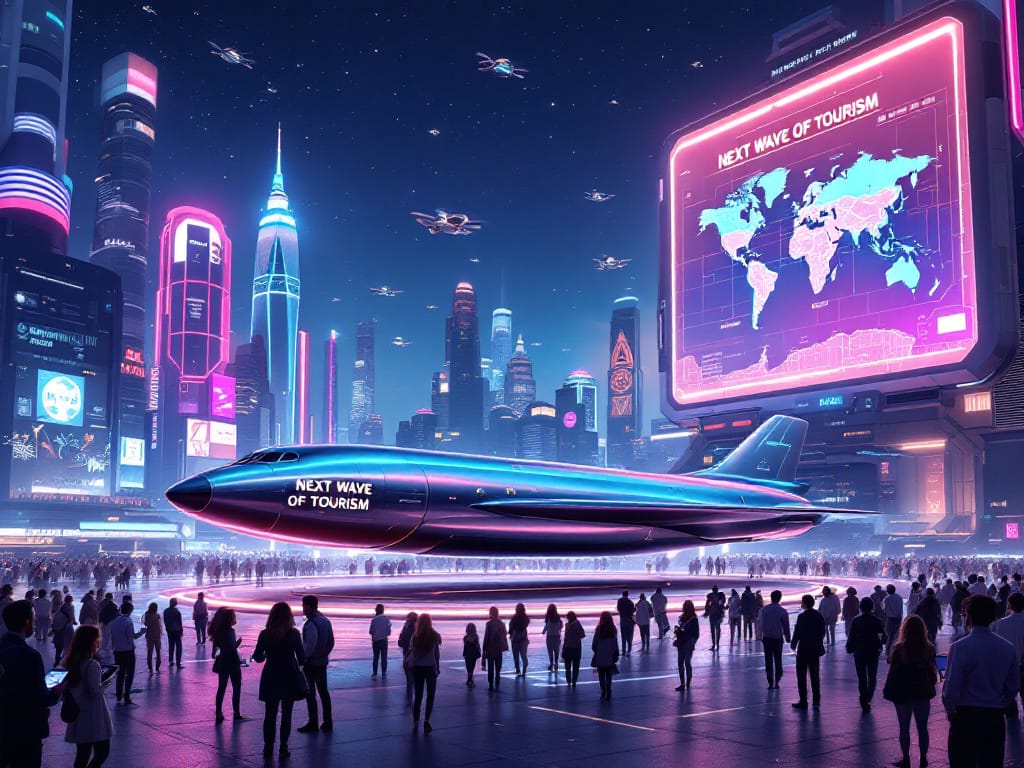Next Wave of Tourism
Next Wave of Tourism The world of tourism is constantly evolving, shaped by technological advancements, economic shifts, and global events. In recent years, the industry has undergone a massive transformation, largely driven by the COVID-19 pandemic. As we move forward, the “next wave of tourism” is emerging—one that prioritizes sustainability, personalization, and technological integration. This article explores the latest trends that are set to define the future of travel.

1. Sustainable and Eco-Friendly Tourism
One of the most significant changes in the travel industry is the shift toward sustainability. More travelers are becoming conscious of their environmental impact and are seeking eco-friendly options.
- Eco-conscious accommodations: Hotels and resorts are implementing green practices, such as solar energy, water conservation, and waste reduction.
- Carbon footprint reduction: Airlines are investing in biofuels, and travelers are opting for train journeys over short-haul flights.
- Community-based tourism: Travelers are choosing destinations that promote local culture and benefit indigenous communities.
Governments and travel organizations are also encouraging sustainable practices through incentives and regulations, ensuring a balance between tourism growth and environmental preservation.
2. Digital and AI-Driven Travel Experiences
Technology is playing a crucial role in reshaping the travel industry. AI-driven tools and digital innovations are enhancing user experiences while making travel more seamless and personalized.
- AI-powered chatbots: Many travel companies are using AI chatbots to provide real-time assistance and recommendations to travelers.
- Smart tourism apps: Mobile applications now offer AI-driven itinerary planning, language translation, and real-time updates.
- Virtual reality (VR) and augmented reality (AR): These technologies allow travelers to preview destinations before booking, enhancing decision-making processes.
With the rise of artificial intelligence, tourists can expect a more customized and efficient travel experience in the coming years.
3. Rise of Workcations and Digital Nomadism
The pandemic changed the way people work, and remote work has given rise to “workcations”—a combination of work and vacation. Many professionals now choose to work from exotic locations, allowing them to enjoy new experiences while staying productive.
- Flexible travel options: Countries like Portugal, Thailand, and Mexico have introduced digital nomad visas to attract remote workers.
- Co-working tourism: Hotels and resorts now offer dedicated workspaces with high-speed internet and office amenities.
- Longer stays: Instead of short vacations, travelers are opting for extended stays, blending work with leisure.
This trend is reshaping traditional tourism models, giving rise to a new era of travelers who prioritize flexibility and mobility.

4. Health and Wellness Tourism
In the post-pandemic world, travelers are prioritizing health and wellness more than ever before. The demand for wellness retreats, meditation escapes, and holistic healing experiences is growing.
- Wellness resorts: Destinations offering yoga retreats, spa therapies, and mental health programs are becoming increasingly popular.
- Medical tourism: Many travelers are seeking medical treatments abroad, benefiting from lower costs and high-quality healthcare facilities.
- Nature-based travel: More people are choosing destinations that promote relaxation, such as mountains, beaches, and rural countryside locations.
Wellness tourism is expected to become a multi-billion-dollar industry as travelers seek experiences that nourish both the body and mind.
5. Experiential and Cultural Travel
Today’s travelers are no longer content with just sightseeing; they crave immersive experiences that connect them with local cultures.
- Culinary tourism: Food lovers are exploring local cuisines, street markets, and farm-to-table dining experiences.
- Heritage tourism: Historical sites, UNESCO World Heritage locations, and indigenous cultural experiences are drawing tourists seeking authenticity.
- Adventure travel: Activities like trekking, scuba diving, and wildlife safaris are gaining popularity as people seek thrill and exploration.
Rather than traditional sightseeing, travelers now look for unique experiences that create lifelong memories.
6. The Role of Social Media and Influencers
Social media continues to shape the tourism industry, with platforms like Instagram, TikTok, and YouTube influencing travel decisions.
- User-generated content: Travelers rely on real-time reviews and travel vlogs for insights into destinations.
- Influencer marketing: Many brands collaborate with influencers to promote hidden gems and unique travel experiences.
- Livestream tourism: Virtual travel experiences are becoming common, allowing users to explore destinations through digital platforms before booking.
Social media has become an essential tool for travelers, helping them discover, plan, and share their journeys with the world.
7. Hyper-Personalized Travel Experiences
Customization is the future of tourism, as travelers seek experiences that cater to their unique preferences and interests.
- AI-driven recommendations: Travel agencies and apps use AI algorithms to suggest tailored itineraries based on user behavior.
- Bespoke travel planning: Luxury travelers are opting for customized tours, private guides, and curated experiences.
- Themed vacations: From culinary and art-focused trips to music and film tourism, niche experiences are becoming a growing trend.
By leveraging data analytics and AI, the travel industry is delivering highly personalized and memorable travel experiences.
8. Space Tourism: The Final Frontier
While still in its early stages, space tourism is becoming a reality. Companies like SpaceX, Blue Origin, and Virgin Galactic are pioneering commercial space travel, making it accessible to high-net-worth individuals.
- Suborbital flights: Tourists can now experience a few minutes of weightlessness and breathtaking views of Earth from space.
- Lunar tourism: Plans for moon missions and potential lunar hotels are already in discussion.
- Future prospects: As technology advances, space tourism may become more affordable and mainstream.

Although currently limited to the ultra-wealthy, space tourism represents the ultimate travel experience of the future.
Conclusion
The Future of Travel The next wave of tourism is driven by sustainability, technology, and personalization. Travelers are seeking meaningful experiences that align with their values, whether it’s eco-conscious travel, digital integration, or immersive cultural journeys. As the industry adapts to new trends and demands, the future of tourism looks exciting, innovative, and full of endless possibilities.
Are you ready to explore the next era of travel? The world is waiting!
Read More: The Future of Smart Speed Bump
Read More: High-Performance Concrete Build Business Case Value
